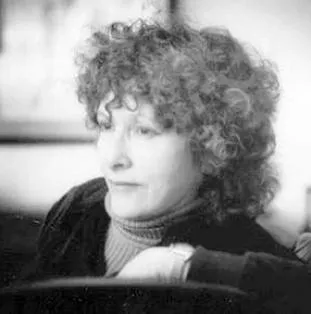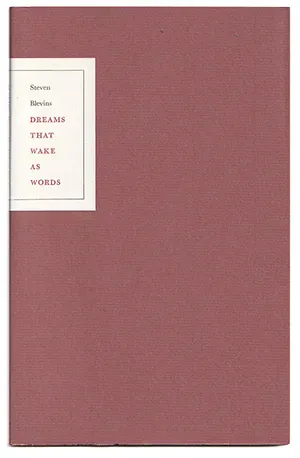DREAMS THAT WAKE AS WORDS
STEVEN BLEVINS
Some poets never become famous. Make that most poets. If you want to be rich and famous, poetry may not be your career path.
This has always been true, even in the eras when poetry was the primary written art form. For every Shakespeare or Byron or T.S. Eliot, there were multitudes of poets whose work floated away on the streams of time. Even those who survived their own eras to become famous later thought they were dying in obscurity, like John Keats (1795-1821) whose tombstone reads "Here lies one whose name was writ in water."
Keats died of tuberculosis–the plague of his times–but HIV/AIDS was the terrifying epidemic for those of us living as young adults in the 1980s and '90s. We will never know how many poets died from AIDS in the decades before antiviral medications were developed, but one such poet, Steven Blevins, was an AIDS victim whose work was rescued by an act of tremendous generosity.

Poet Denise Levertov (1923-1997) made sure that Blevins' poems were collected and published after his death she had been his teacher, employer, and friend. From her introduction to Dreams That Wake As Words, we know that Blevins showed up in her poetry class at the University of Cincinnati in 1973, became her secretary for several years, and stayed in touch with her after he moved to New York City, where he eventually died of AIDS. Though Levertov does not give Blevins' birth or death dates, I imagine that he might have been twenty years old when he took her class, and perhaps forty when he died, given that Levertov herself passed away in 1997. Levertov, who lived in Maple Valley and was a great supporter of Seattle poets, collected Blevins' poems in an elegant volume that captures his voice–full of love, grief, and hope–and makes sure that the name of Steven Blevins, poet, is not writ in water.
I Love You Dolly Parton
I love you Dolly Parton
though your hair is fake
as the Swiss Chalets of Disneyland,
though your bra and girdle
allow you to defy
gravity and deceive
the eye, though your shadows
and blushes are pure
Max Factor, I love you.
Because under the gloss,
a child watches the world
from Appalachian hills,
and through her hungry mouth
springs the country's diva's
perfect fountain of sorrow,
sung so sweetly
bees listen
with envy.
Every time your soprano
soars above the schmaltz,
there's my poor relations
making ends meet,
there's the barn smell,
light over Ohio,
autumn setting fire to the trees,
brighter in your voice
than in all the violins in Hollywood.
The Next Word
Whenever I want you
I write a poem about the way you looked
on a given night, streetlight
in your hair, laughter
making your eyes open books.
I think then I'll be able
to read you and have you with me
always, a joyful arrangement
of words and punctuation
through which no detail of you
is lost.
But the time comes when I must
put down the pen and the book
and wander around my lonely life
calling your name.
No poems will do, no memory
can save me. The next word
like the tree in the forest
falling with no one to hear
must reach your ear
to be spoken.
Valentine
They are perfect blood red tulips,
dark eyes circle the yellow
fire and they will open
and fall like you,
the only color in this impossibly white
landscape. For a year
your ashes have sung
to me. Maybe even you are weary
of so many tears from one man.
The news you probably already know:
Greg can't die fast enough and Tommy's
gone blind in one eye, maybe the other.
Blind he said with Audrey Hepburn's
intonation and there it was
that total fearlessness
I fear not having. Oh your
silver tones were a gift
man does not expect to be given.
Every week they take more of my blood
and send it away. My ghost is following,
through this white blindness
your trail of petals.
Dreams That Wake as Words (Tangram, 1997), by Steven Blevins, was printed in an edition of 180; copies are still available online. The original proceeds were donated to a volunteer organization that offered meals, housecleaning services. and general support to AIDS patients.
Sharon Cumberland is Professor Emeritus of English and Creative Writing at Seattle University. Her poetry collection Found in a Letter 1959 is forthcoming from Ex Ophidia Press in January 2022.


